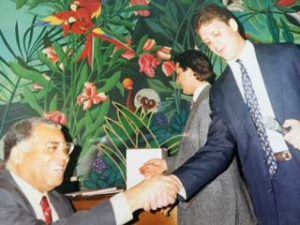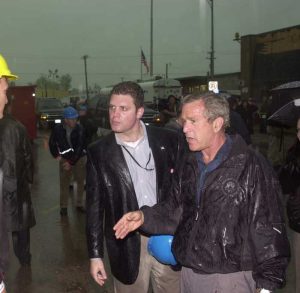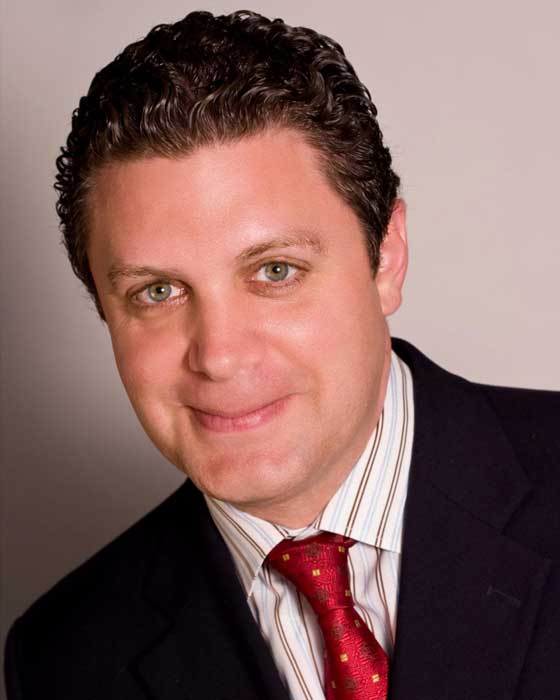Patrick Rhode tapped as keynote speaker for Mass Communication Awards Ceremony
In 2016, Patrick Rhode fulfilled a long-held goal of graduating from the University of Arkansas at Little Rock, a journey 25 years in the making.
Rhode, U.S. vice president of corporate affairs for the global infrastructure firm, Cintra, will return to his alma mater as the keynote speaker of the School of Mass Communication Awards Ceremony on Thursday, April 12, to share his journey from a UA Little Rock college student to a career that would span the White House and high profile senior executive roles in government and private industry.
The awards ceremony will take place from noon to 2 p.m. in the Donaghey Student Center Ledbetter Hall.
Rhode’s notable career has taken him from Fortune 500 and 1000 companies to NASA as well as to the White House. After serving as the deputy director of National Advance Operations for George W. Bush’s successful presidential campaign in 2000, Rhode was sworn in by the Vice President in the East Room of the White House as a special assistant to to the President of the United States.
When the U.S. Department of Homeland Security was created in the aftermath of the 9/11 tragedy, Rhode was named chief of staff for two FEMA administrations within the department responsible for more than 100 Presidential Disaster and Emergency Declarations. The department assisted more than 1 million Americans during his tenure, during which time he was awarded high level national security clearances. He has also served as the associate administrator of the U.S. Small Business Administration and senior advisor to NASA.
From UA Little Rock to the White House and beyond
After Rhode earned a bachelor’s degree in political science from the University of Arkansas in 1991, he came to UA Little Rock in search of a new career path.
“UA Little Rock is special to me because it was the place where I first learned to leave my comfort zone and try something I had never tried before,” he said. “Something kept calling me to try broadcast journalism, and attending UA Little Rock gave me the chance to learn skills on campus as well as at a local television affiliate.”
He credits UA Little Rock with giving him the tools that led to early career roles as an award- winning television reporter with CBS and ABC television affiliates.

“It was my time at UA Little Rock that gave me the confidence to try a career path that led me in so many directions,” Rhode said. “I was encouraged by great professors and had a series of great formative experiences at UA Little Rock, from interviewing the actor James Earl Jones for the student radio station news and getting him to say, ‘This is UALR,’ just the same way he once famously said, ‘This is CNN,” to helping then CBS anchor Paula Zahn climb a fence barricade around the crowd in downtown Little Rock on election night in 1992 to make a live report on time.”
While at UA Little Rock, he also interned at KARK, which later led him to his first job.
“I only hope that longtime Arkansas journalist Steve Barnes and others at KARK Television in Little Rock don’t remember the kid intern that kept scotch-taping the wrong script order in the teleprompter,” he joked.
Rhode left UA Little Rock in 1993, just three credit hours short of graduation, to pursue a career as a television reporter for the CBS affiliate in Tuscaloosa, Alabama. When he left that job, the mayor of Tuscaloosa presented Rhode with a proclamation declaring a day in June as Patrick Rhode Day in honor of his great news coverage of the city.
“Truthfully, I think the recognition was for the notoriety of an April Fool’s story we did declaring that a late night city ordinance would forever remove the name of Bear Bryant from the University of Alabama football stadium,” he said. “The television audience did not wait to hear the city council say April Fool’s at the end of the piece before the phone lines at the station began to light up in protest.”
Completing his bachelor’s degree in mass communication from UA Little Rock is a goal he never forgot.
“I had thought about finishing many times over the years but always had an excuse,” Rhode said. “I was having a conversation a few years ago about what influenced and motivated our early career decisions. Every example I spoke of was my time at UA Little Rock. As I reflected, I thought to myself, ‘How could I not have a degree from the school that taught me so much?’”
With the help of Dr. Olaf Hoerschelmann, interim associate dean of the School of Mass Communication, and Dr. Jeanne Rollberg, an associate professor of journalism from 1983 to 2016, he proudly completed his degree in 2016.
“More than 20 years after leaving UA Little Rock, I sent a somewhat embarrassing note to Dr. Olaf Hoerschelmann explaining my situation and asked if there might be a way I could complete coursework. After so many years, I was not even sure records still existed of me, ha. Dr. Hoerschelmann and the entire university staff were so helpful in their direction of my coursework completion, and immediately welcomed me back home. It feels like a fitting end to a long journey that began at UA Little Rock.”
Rollberg recalled that Rhode was a “very bright and talented student,” but that she was somewhat surprised to see his email so many years later.

“I confess to have given up on his ever graduating because the time lapse had been so long,” Rollberg said. “I was very glad and proud for him when he decided to finish.”
The end of Rhode’s journey to getting a degree at UA Little Rock is just the beginning of his path to inspiring the next generation of aspiring mass communication professionals. His keynote speech, “Leaving the Zone,” will cover how continuously leaving his comfort zone led to incredible career opportunities and personal growth.
“We all live in our comfort zones,” Rhode said. “But sometimes our personal and professional experiences of growth are informed most by leaving the zone. My path through several careers has been imperfect, but I don’t think we have to be perfect. Transitions are not easy. There are failures. There are self doubts. There all always critics and naysayers. But I believe we often find ourselves when we leave the zone.
“It was my experience at UA Little Rock that first set me on a path of leaving my zone that resulted in experiences that I never would have imagined. I’m pretty sure while sitting in class that my dreams included a simple hope that my car would start back up again that afternoon near University Avenue, and I never would have believed that I would have the chance to help bring billion dollar infrastructure projects to market, or that Air Force One would one day have a seat reserved for me.”
